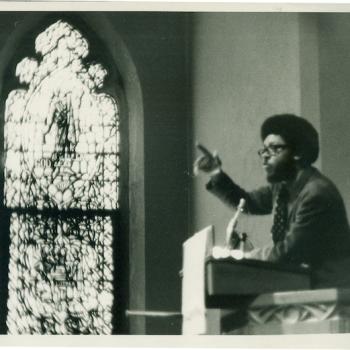So as we consider abortion, it's important to remember the heart. It's hard to rip the natural, God-given heart out of a human being. There's something there, when someone looks at that ultrasound image. It resonates. I think that's the God-factor. Even in our core being, even if we don't know God or have a relationship with him in a Christian context, there's something in our heart that says, this is not good to kill this baby.
Are events like the Kermit Gosnell case shaping public perception of abortion?
Absolutely. It's adding weight to the debate. We had quite the revelation there for about a two- or three-week period where the Gosnell situation was exposed. We had the Manhattan research that showed that 40 percent of pregnancies in Manhattan were ending in abortion. Then we had the sting operation by Lila Rose that showed the underage sex-trafficker talking about how to get abortions for girls, and the Planned Parenthood staff seemed to support that perspective in the video.
All this revelation came within a two-to-three-week period. It's as if the Lord peeled back the deceptions and revealed what this industry is all about. There's a lot of seediness and ugliness that occurs when we're talking about exterminating human beings. I don't care if it's one hundred years ago or today, it's just not wise or healthy or spiritually right for a culture to embrace that.
Turning to another subject, is the struggle against gay marriage a lost cause? Are Christians who stand for traditional marriage destined to lose this one?
Our duty as Christians is never to abandon what is right. Even though the environment may be very much against us, we can't think of it as a lost cause. Scripture is clear about God's design for human sexuality. It's reserved for the marriage of one man and one woman. We should never give up articulating that, even if the culture doesn't agree. We've got to continue to stand for what we believe, no matter what happens.
Although many votes recently have been overwhelmingly supportive of traditional marriage, there have been shifts in some places. Same-sex marriage is now legal in a handful of states. We know that, we understand that. But from a Christian perspective, it's important to understand that there is a clear biblical definition of marriage: a union between one man and one woman. Christ himself mentions it in Matthew 19. Christ reinforces that definition when he cites the Genesis definition: "A man shall leave his mother and father and cleave to his wife, and the two shall become one flesh." It's very clear.
Even where there hasn't been spiritual illumination, it seems that every culture gets this. They get married, in some form or fashion. Marriage serves a benefit to the culture. It's utilitarian at the very least that women and men get together to procreate and make the next generation of children. Marriage has played a role in every civilization. Then Jesus comes on the scene and reinforces, from a Judeo-Christian standpoint, that this is an institution from God.
Many supporters of same-sex marriage object to the fact that most of us in the Christian community support traditional marriage. We're just trying to live out the tenets of our faith. We see it very clearly stated in the New Testament that marriage is one man and one woman. So when people have an issue with that, they really have an issue with the scriptures. I understand the culture could change, but we're still going to stand and speak truth from our perspective regarding the biblical model of marriage.
I want to give you a chance to respond to some bumper-sticker caricatures. "Evangelicals are only pro-life up to birth."
It's an easy way to attack someone, because we in the Christian community have a fervent commitment to the view that a baby deserves to be held sacred, made in the image of God. Yet when the baby is born, of course we need to keep on supporting life, especially single-parent mothers who make the decision to keep their children. So at Focus on the Family we're trying to find a holistic approach to helping the mother, providing counseling for families who adopt, and many other things.
How, then, can evangelicals be pro-life and yet support the death penalty?
I think there's a general understanding between fair-minded people that these really are two very different things. In the pro-life debate, we seek to protect innocent life. These children haven't done anything to be condemned to death.
Where you have serious murder charges, fair-minded people could differ on this. I could easily be persuaded to move to a life-sentence-without-parole position. You want every human being, regardless of his or her crime, to have an opportunity to repent and know the Lord Jesus Christ. So I'm not aggressive when it comes to the capital punishment issue. I can support it and have supported it. But if the pro-abortion people were to say, "Listen, we would end abortion if you'd stop supporting capital punishment"—even though I don't equate those two in any moral way, I would jump at the chance.





